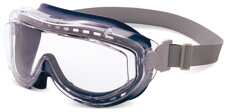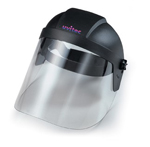- Reasons for Wearing Eye Protection
- Types of Eye Protection
- First Aid for Eye Injuries
- SLS Policy on Eye Protection
- Procedure for Obtaining Non-Prescription Safety Glasses
- Procedure for Obtaining Overspec Safety Glasses
- Procedure for Obtaining Prescription Safety Glasses
 |
If risk assessment shows there is higher than normal risk of eye damage, perhaps due to the chemicals used or the nature of the procedure, it may be appropriate to wear safety goggles, which give better protection by due to the rubber seal all the way around the eyes, or a face visor/shield. The chemical hazard assessment or safety data sheet will indicate when there is risk of severe eye damage/blindness. Corrosive chemicals are the usual culprits. Forcing liquid through a system under pressure is one procedure where the likelihood of getting chemicals in your eyes is higher than average. A common example is forcing a solution through a syringe filter, especially if the filter is just slip locked, rather than leur locked, onto the end of the syringe.
|
When flying projectiles are a concern an impact resistant face visor is usually preferred since it will also give protection to the face and neck. Such visors are used when working with liquid nitrogen, primarily due to the slim but very real chance of sample storage vials exploding upon removal from the LN2 cryostore. Special visors, similar to the one pictured, are also used to protect against UV radiation when working with transilluminators that do not have their own safety-interlocked shielding. Make sure UV visors are clearly labelled as such and not easily confused with non-UV visors. |
 |
First Aid for Eye Injuries
-
If
eyes become contaminated with a potentially harmful substance:
- Rinse immediately with copious amounts of clean, cold water. Eyes must be held open during rinsing. There is no need to use sterile saline solution, tap water will do.
- Summon a First Aider and they will advise if medical attention is required.
- If no First Aider is available, seek medical attention immediately at A&E or your GP's surgery.
-
If
eyes are injured by a flying projectile and/or a foreign object becomes
lodged in the eye:
- Summon a First Aider immediately.
- Cover both eyes with a sterile dressing.
- Seek medical attention immediately at A&E or your GP's surgery.
SLS Policy on Wearing of Eye Protection
Version 3
- Eye protection must be worn at all times by personnel working in laboratory areas. Standard safety glasses will suffice in most instances. Risk assessment will determine if specialist eye protection is necessary.
- Eye protection must be: suitable for the purpose; comfortable to wear for the time period required; a good fit for the individual; well maintained; properly stored; regularly checked by the wearer; and repaired or replaced if it is found to be damaged or worn out. Safety Services provide additional guidance on choosing appropriate eye protection.
- If wearers of prescription spectacles require safety glasses and if their contract exceeds 6 months, prescription safety glasses will be provided. For all short term staff/students, visitors and those members of personnel who spend only a small proportion of time in the lab (e.g. porters), over-spectacle safety glasses will be provided.
- A limited but adequate range of eye protection, prescription and non-prescription, will be made available to all personnel who require it and the cost will be met by the School, including replacements for lost or broken items.
- If you are working in a environment where the risk of eye damage is assessed as negligible, e.g. a dedicated microscopy suite, eye protection is not required.
- Staff merely 'passing through' laboratories are not required to wear eye protection providing they have an appropriate awareness of the potential hazards and risks associated with a busy laboratory or are under the supervision of a member of personnel who has the requisite knowledge.
- The responsibility for complying with this policy lies with all individuals working in laboratories whilst Principal Investigators and other line managers have the responsibility of ensuring compliance.
Procedure for Obtaining Non-Prescription Safety Glasses
- Individual chooses from the available range. (Lab Managers should put together their own set of samples for staff to try on.)
- Lab Manager orders from SLS Stores via PECOS.
- If individual has a valid reason for not accepting any of the styles on offer, i.e. discomfort or distorted vision, they can choose an alterative style from the Arco on-line catalogue up to a cost of £5. If the available styles are rejected for purely cosmetic reasons, the alternative pair must be paid for by their PI.
- Safety goggles will only be supplied if the risk assessment for the individual's work concludes that they are required, i.e. safety glasses do not give enough protection. Goggles can be selected from the Arco on-line catalogue, up to a cost of £10.
- SLS will also hold a selection of spare safety glasses/goggles.
Procedure for Obtaining Overspec Safety Glasses
- Prescription spectacle wearers who will be here for less than 6 months, or those who spend a minimum amount of time operating within lab areas, will be supplied with overspec safety glasses rather than prescription safety glasses.
- People waiting for prescription safety glasses will be supplied with overspec safety glasses until their prescription safety glasses arrive.
- Individual chooses from the available range. (Lab Managers should put together their own set of samples for staff to try on.)
- Lab Manager orders from SLS Stores via PECOS.
- If individual has a valid reason for not accepting any of the styles on offer, i.e. discomfort or distorted vision, they can choose an alterative style from the Arco on-line catalogue up to a cost of £5. If the available styles are rejected for purely cosmetic reasons, the alternative pair must be paid for by their PI.
- Each official visitor's lab coat, i.e. each lab coat kept on the rail in the Atrium/at Reception, will have a pair of basic overspec safety glasses in the pocket.
- SLS will also hold a selection of spare overspecs.
Procedure for Obtaining Prescription Safety Glasses
(updated 1/2/17)
- Spectacle wearer submits a request to their Lab Manager including their name, staff/student ID number, Division and stating whether they have a current UK issued prescription.
- Lab Manager generates a Uvex order form by logging in to the Uvex Prescription Site with the username and password issued by SLS Safety. (Click here for Uvex user guide.)
- The spectacle wearer takes the form to the designated Optician, i.e. Optical Express, 96 High Street, Dundee, DD1 1SD. The Optician holds the complete range of Uvex prescription safety spec frames.
- Lab Manager also generates a FileMaker order for each Uvex order form. Ensure FileMaker order number is recorded on Uvex form.
- If spectacle wearer has a current, UK issued prescription they do not need to call ahead to make an appointment with the Optician; just drop in with the order form and a copy of their prescription.
- If spectacle wearer does not have a current, UK issued prescription they will have to undergo an eyesight test before choosing their frames. Call ahead to arrange an appointment with the Optician on 08000232020 or book on-line. Remember to select Dundee, 96 High Street, when asked to specify a clinic/store.
- The Optician completes the order form and sends it direct to Uvex. Spectacle wearer should ask for confirmation of the lens, frame and any necessary extras - information the Lab Manager requires for invoice checking. Ask for a photocopy of the order if you might forget the details.
- Note: safety goggles should only be selected if the risk assessment for the individual's work concludes that they are required, i.e. safety glasses do not give enough protection.
- Uvex sends the prescription safety glasses to the Optician within 10 working days. The Optician then contacts the spectacle wearer to arrange final fitting and collection.
- Spectacle wearer informs Lab Manager once they have collected their safety glasses, confirming the frame and type of lens.
- Lab Manager enters frame/lens details into the relevant FileMaker order for cross referencing with the invoice once it arrives.
- Invoice will come to Lab Manager for final checking/signing off. Click here for the current price list. Note: surcharges may be incurred for non-cosmetic extras, e.g. special lens to fit curved frames. Surcharges up to the value £50 are automatically authorised; surcharges above £50 have to be approved by the Authorising Officer i.e. SLS H&S Adviser.





